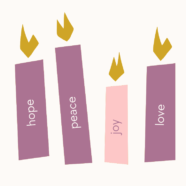
Welcome to Advent! This is a season of preparation, of making our hearts and minds ready to receive the good news that God has come to us once again. It’s also a season of waiting and longing, not only for the celebrations of Christmas but for Christ’s return, when our hope will become sight and our prayer will become praise.
This year, even in the midst of indulgence and celebrations and lights and decorations and events – we’re using this space to zero in on what we’re REALLY hungry for: hope, peace, joy, and love.
For the next four weeks, we’ll take a look at each one in turn as we hear the familiar stories once again.
Our second reading for today is from the gospel of Luke.
Just before this, the writer introduced us to a man named Zechariah, who was a priest in the temple, and his wife Elizabeth. They had been unable to have children, and believed they were too old. But while he’s in the temple making an offering, the angel Gabriel comes to Zechariah and says they will have a son – John. He scoffs a little, and Gabriel says “because you didn’t believe me, you aren’t going to say a word until the child is born.” So Zechariah becomes unable to speak. When his term of service is over, he goes home, and Elizabeth does in fact conceive a child. She remains in seclusion for five months – and that’s where we pick up the story.
Scripture: Luke 1:26-38
In the sixth month the angel Gabriel was sent by God to a town in Galilee called Nazareth, to a young woman engaged to a man whose name was Joseph, of the house of David. The young woman’s name was Mary. And he came to her and said, ‘Greetings, favored one! The Lord is with you.’ But she was much perplexed by his words and pondered what sort of greeting this might be. The angel said to her, ‘Do not be afraid, Mary, for you have found favor with God. And now, you will conceive in your womb and bear a son, and you will name him Jesus. He will be great, and will be called the Son of the Most High, and the Lord God will give to him the throne of his ancestor David. He will reign over the house of Jacob forever, and of his kingdom there will be no end.’ Mary said to the angel, ‘How can this be, since I am a virgin?’ The angel said to her, ‘The Holy Spirit will come upon you, and the power of the Most High will overshadow you; therefore the child to be born will be holy; he will be called Son of God. And now, your relative Elizabeth in her old age has also conceived a son; and this is the sixth month for her who was said to be barren. For nothing will be impossible with God.’ Then Mary said, ‘Here am I, the servant of the Lord; let it be with me according to your word.’ Then the angel departed from her.
The last book of the Old Testament – the book of Malachi – was written more than four hundred years before the birth of Jesus.
For four hundred years, the people went about their lives, their worship, their prayers, their business – and they waited. God had promised a Messiah – someone who would reclaim the throne of David and fend off all the warring empires that came and went, rose and fell. Someone who would restore righteousness and order. Someone who would be their direct connection to God, like David and Solomon. Whatever the problem was, the Messiah would make it alright again.
Mary was a young woman in a patriarchal culture, newly engaged, living in a poor town in a country under the thumb of the Roman Empire. She had very, very little power to change her circumstances or to change the world. I don’t know how hopeful she was feeling about her future, or the future of her people, before this conversation with a messenger from God.
But Gabriel’s promises to Mary are bold, world-changing promises. Suddenly, and without warning, a very different kind of future emerges for her – and while she may have been afraid, she also embraced that opportunity to be part of God’s work in the world. She embraced hope, despite every odd.
In contrast, especially in the US right now, despair seems to be the fashionable choice. Cynicism is in vogue. Everyone and everything is terrible, and it always will be. Why bother trying? Why on earth should we pour out our time, energy, and money into what seems to be a black hole of need, despair, and rage?
Anybody else heard that story lately?
The problem is, once you embrace the narrative of despair, there is no room for anything else. Love only leads to pain and disappointment. Trust only leads to betrayal. Action only leads to exhaustion and danger. Community and connection only lead to grief. Generosity only leads to being taken advantage of.
Before you know it, you’ve convinced yourself that the only way to live safely is to go it alone – and that despair and loneliness becomes a self-fulfilling prophecy.
If this narrative sounds familiar, it should. This is the story that Ebenezer Scrooge embraced before his visits with the ghosts of Christmas past, present, and future.
It seems so obviously silly when you attach a name like Ebenezer Scrooge to it – none of us would want to admit to being like that guy. But somehow, it seems logical – enlightened, even – when we hear it from pundits and podcasters as an explanation for why the world is the way it is, and why we should just eat, drink, and be merry and leave everyone and everything to their own devices.
But here’s the thing: although it sounds good in the moment, we’re not actually hungry for an explanation or an excuse to give up and withdraw. Those impulses are a reaction to being wounded somehow, but they will not nourish us or the world.
What we’re really, truly hungry for is hope – that fusion of longing and action. One without the other is a recipe for burnout. Longing without action feels like going to endless meetings to talk about forming another committee to look at the possibility to think about forming a committee to study the possibility that we might change things. Action without longing is purposeless, driving in circles, doing the same things over and over and over again but expecting different results.
But true hope can take our longings and our restlessness and put us to work for the good of our communities, our churches, and our world.
But what are we hoping for?
Our ultimate hope is in God’s work – God’s eternal kingdom, where we will feast together at Christ’s table.
But Jesus – God With Us – offers us here-and-now hope, too. This is the hope of Mary, who trusted Gabriel’s promises and said “yes” to God’s work in her and through her.
So what is it you’re hoping for?
What do you hope your community will look like/feel like in 10 years?
What do you hope will change or grow in you in the next couple years?
What steps can you take right now to start in that direction? To begin walking that road?
One of my great hopes for the community is that we can rebuild a sense of connection and trust among neighbors.
As many of you know, I have a dog at home who is aptly named Hope. She’s a beagle mix, and no matter the weather, she demands her daily walk. We walk various routes through my neighborhood in Grand Rapids, and she sniffs every blade of grass along the way. One of the small ways I try to work toward building community is to be at least a little friendly to everyone I meet on the sidewalk, which can be hit or miss.
Yesterday afternoon, I took Hope out for her walk despite the snow. We were almost to the end of our block when one of my neighbors with two dogs on leashes came barreling around the corner. One of the dogs was big, and not friendly – it immediately started barking and snarling and lunged toward us. In the process, it pulled my neighbor clear off her feet and before I knew it, she was lying stretched out in the snow, desperately trying to keep hold of the leash. The dog was still lunging, and by this time she was also swearing at the dog very, very loudly.
As much as I wanted to help, I quickly realized that the best thing I could do was go back the other way to remove the source of the dog’s frustration, so she could regroup and get up. So Hope and I booked it back home. Thankfully she was fine, though she continued screaming at the dog very loudly all the way back to her house.
This wasn’t a scary experience, just…unsettling.
Once they were safely inside, we wove through the neighborhood, and as we were coming back towards home, we met another person on the sidewalk. He was all bundled up and looking pretty intently at his phone, so I debated whether to walk off into the grass with Hope to let him pass us without interruption.
But as we got closer, he put his phone back in his pocket and looked up – and when he saw Hope, he got this giant smile on his face. She was busy sniffing something, but he said “hi, puppy!” in the cute little way you address dogs and babies, and she immediately went bounding over to say hello. He was DELIGHTED by this. She got some ear scritches, we exchanged pleasantries, and then we both went on our way.
As I un-bundled myself at home, I thought about those two very different interactions. If I had let the first one determine my outlook for the entire day, or even just my entire walk, I would’ve spent so much time being unnecessarily wary of my neighbors – and I could’ve missed out on that lovely second moment, getting to see the joy of a happy dog and a happy human interacting.
Hope can be big, world-changing projects, or it can be as simple as trying again when something goes off the rails the first time.
The promise that Gabriel made Mary is the same promise we place our hope in today: that God is coming to us – not to punish or scold or lay waste to our enemies, but to love, embrace, and transform us. The hope of Advent reminds us that we live in the already AND the not-yet – God has come, and God will come.
I want to leave you today with one of my favorite Advent poems, by Madeleine L’Engle, called ‘After Annunciation.’ When hope seems a little too whimsical, or even foolish, remember:
“This is the irrational season
when love blooms bright and wild.
Had Mary been filled with reason
there’d have been no room for the child.”

